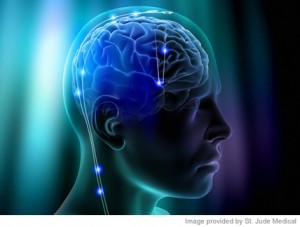Canadian researchers have verified that deep brain stimulation (DBS) is a safe, new approach that has shown tremendous results for patients with treatment-resistant depression.
Published online today, in Biological Psychiatry, the study, lead by Dr. Andres Lozano, Neurosurgeon at Krembil Neurosciences Centre – Toronto Western Hospital and Canada Research Chair in Neuroscience, involved using DBS in 20 patients, targeting an area of the brain that is shown to be overactive in depression.
“Our research confirmed that 60 per cent of patients have shown a clinically significant response to the surgery and the benefits were sustained for at least one year,” said Dr. Lozano. “The underpinnings of depression are poorly understood and this therapy, although not perfect, offers numerous advantages.”
The possibilities of DBS to treat depression was first published is 2005, by Dr. Lozano and his research team, when six patients were treated. Today’s study reports the outcomes for an additional 14 patients for a total of 20 patients followed for one year.
“Thanks to these doctors I now have my life back,” said Sean Miller, a patient who had DBS to treat his depression. “The pain, fear, anxiety and depression are pretty much completely gone and I am now a very happy, healthy, working, active, fulfilled and grateful individual.”
This DBS therapy is geared to a very specific depression. “The treatment is designed for patients with Major Depressant Disorder and who have been unresponsive to numerous other treatments,” said Dr. Sidney Kennedy, lead psychiatrist for the study and Psychiatrist-in-Chief at University Health Network. “After DBS, patients have been able to use psychotherapy techniques and reduce medication as they steadily re-build their lives.”
The study also revealed PET data showing how DBS changes activity in the brain circuitry of depression. The results suggest that deep brain stimulation leads to changes in the metabolic activity of the “depression circuit” resulting in the clinical benefits observed
Source: University Health Network

